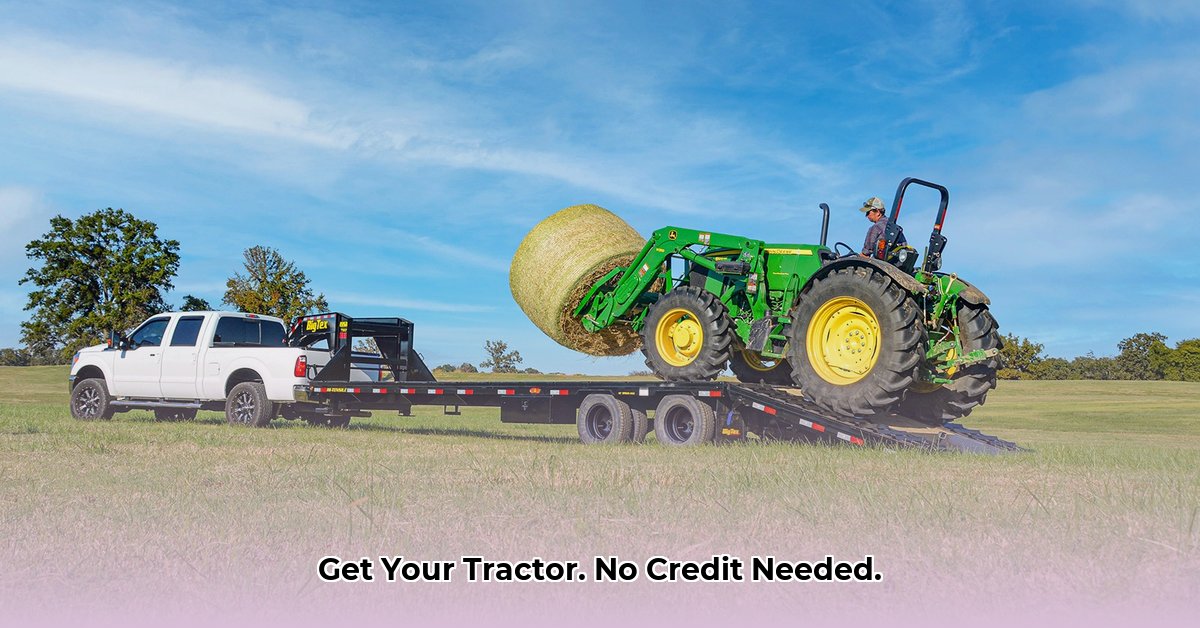
Understanding Rent-to-Own Tractors: A No-Credit-Check Option
Need a tractor but have less-than-perfect credit? Rent-to-own (RTO) programs offer a potential solution, allowing you to use a tractor while making payments, eventually owning it. However, this financial path isn't always the best choice. Let's explore the details to help you make an informed decision. For more information on compact tractors, check out this helpful resource: compact tractor options.
The Rent-to-Own Process: A Step-by-Step Guide
Rent-to-own for tractors typically involves these steps:
- Application: You apply, providing personal information. A credit check might happen, but it's usually less stringent than traditional loans.
- Agreement: Upon approval, you sign a contract outlining monthly payments, total cost, agreement length, and ownership transfer conditions.
- Payments: You make regular payments. The total amount paid will generally exceed the tractor's initial cash price.
- Ownership: After fulfilling the contract's terms, you own the tractor.
- Early Buyout: Many programs allow early buyouts (paying off the remaining balance), though penalties or fees may apply.
Comparing Rent-to-Own Tractor Providers: Rent1 vs. Progressive Leasing
Choosing between different providers requires careful comparison. While specific details vary. Two common model types exist which we'll call "Rent1-style" and "Progressive Leasing-style." Let's compare:
| Feature | Rent1-Style (Equipment Focus) | Progressive Leasing-Style (Consumer Goods Focus) |
|---|---|---|
| Initial Payment Use | Often directly reduces the final purchase price | Usually doesn't reduce the final purchase price significantly |
| Overall Cost | Potentially lower with early buyout | Generally higher than cash purchase price |
| Transparency | Usually clearer terms and conditions | Often needs careful review of the fine print |
| Target Customer | Farmers, businesses needing heavy equipment | Individuals purchasing equipment from retail settings |
| Credit Check Stringency | Often less stringent credit checks | May have slightly different credit requirements |
Important Note: Always get the specifics in writing from each provider. Don't rely solely on generalizations.
Key Questions to Ask Before Signing a Rent-to-Own Contract
Before signing, ask:
- Total Cost: What's the complete cost, including all fees and interest?
- Early Buyout: Can I pay it off early? What are the terms and fees?
- Missed Payments: What are the consequences of a missed payment?
- Legal Protections: What are my consumer rights under state law?
- Hidden Fees: Are there any undisclosed fees or charges?
Potential Risks and Protections in Rent-to-Own Agreements
Rent-to-own agreements can be far more expensive than traditional financing. You could pay significantly more than the tractor's market value. Furthermore, missed payments can lead to repossession, and you might lose both the tractor and any money paid. Understand your state's consumer protection laws.
Alternatives to Rent-to-Own Tractor Financing
Before committing to rent-to-own, explore other options:
- Traditional Financing: While requiring better credit, bank or credit union loans often offer lower overall costs.
- Agricultural Lenders/Farm Credit Unions: These specialize in farm equipment loans and may offer more favorable terms.
- Saving and Direct Purchase: Saving up for a down payment can significantly improve your financing options.
Conclusion: Making an Informed Decision
Rent-to-own tractors offer immediate access but come at a substantial cost. Thoroughly understand the total price, terms, and risks involved before signing any contract. Explore alternative financing options, and if needed, seek professional financial advice. A well-informed decision will ensure your tractor purchase improves your finances, rather than burdening them.